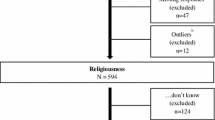Abstract
This study reports on the association between religious beliefs and behaviors and the change in both general and religious social support using two waves of data from a national sample of African Americans. The Religion and Health in African Americans (RHIAA) study is a longitudinal telephone survey designed to examine relationships between various aspects of religious involvement and psychosocial factors over time. RHIAA participants were 3173 African American men (1281) and women (1892). A total of 1251 men (456) and women (795) participated in wave 2 of data collection. Baseline religious behaviors were associated with increased overall religious social support from baseline to wave 2 (p < .001) and with increased religious social support from baseline to wave 2 in each of the following religious social support subscales: emotional support received (p < .001), emotional support provided (p < .001), negative interaction (p < .001), and anticipated support (p < .001). Religious beliefs did not predict change in any type of support, and neither beliefs nor behaviors predicted change in general social support. African Americans who are active in faith communities showed increases in all types of religious social support, even the negative aspects, over a relatively modest longitudinal study period. This illustrates the strength of the church as a social network and the role that it plays in people’s lives.

Similar content being viewed by others
References
Biggar, H., et al. (1995). Women who are HIV infected: The role of religious activity in psychosocial adjustment. AIDS Care, 11, 195–199. doi:10.1080/09540129948081.
Cagle, C. S., Appel, S., Skelly, A. H., & Carter-Edwards, L. (2002). Mid-life African American women with type II diabetes: Influence on work and the multicaregiver role. Ethnicity and Disease, 12, 555–566. http://www.ishib.org/journal/ethn-12-04-555.pdf.
Cohen, S. (2009). Basic psychometrics for the ISEL 12 item scale. http://www.psy.cmu.edu/~scohen.
Debnam, K., Holt, C. L., Clark, E. M., Roth, D. L., & Southward, P. (2012). Relationship between religious social support and general social support with health behaviors in a national sample of African Americans. Journal of Behavioral Medicine, 35(2), 179–189. doi:10.1007/s10865-011-9338-4.
Dupree, C. Y. (2000). The attitudes of Black Americans toward advance directives. Journal of Transcultural Nursing, 11(1), 12–18. doi:10.1177/104365960001100104.
Ellison, C. G., & George, L. K. (1994). Religious involvement, social ties, and social support in a southeastern community. Journal of the Scientific Study of Religion, 33(1), 46–61. doi:10.2307/1386636.
Ellison, C. G., & Hummer, R. A. (2010). Religion, families and health: Population based research in the United States. New Jersey: Rutgers University Press.
Ellison, C. G., Krause, N. M., Shepherd, B. C., & Chaves, M. A. (2009). Size, conflict, and opportunities for interaction: Congregational effects on members’ anticipated support and negative interaction. Journal for the Scientific Study of Religion, 48(1), 1–15.
Ellison, C. G., Lee, J., Benjamins, M. R., Krause, N. M., Ryan, D. N., & Marcum, J. P. (2008). Congregational support networks, health beliefs, and annual medical exams: Findings from a nationwide sample of Presbyterians. Review of Religious Research, 50(2), 176–193. http://www.jstor.org/stable/20447560.
Ellison, C. G., Musick, M., Levin, J., Taylor, R., & Chatters, L. (1997). The effects of religious attendance, guidance, and support on psychological distress: Longitudinal findings from the National Survey of Black Americans. Paper presented at the annual meetings for the Society for the Scientific Study of Religion, San Diego, November.
Engle, V. F., Fox-Hill, E., & Graney, M. J. (1998). The experience of living-dying in a nursing home. Self-reports of black and white older adults. Journal of the American Geriatric Society, 46(9), 1091–1096. doi:10.1111/j.1532-5415.1998.tb06646.x.
Ferraro, K. F., & Koch, J. R. (1994). Religion and health among black and white adults: Examining social support and consolation. Journal for the Scientific Study of Religion, 33, 362–375. doi:10.2307/1386495.
Fetzer Institute, National Institute on Aging Working Group. (1999). Multidimensional measurement of religiousness/spirituality for use in health research: A report of a national working group. Kalamazoo, MI: Fetzer Institute (reprinted 2003).
George, L. K., Ellison, C. G., & Larson, D. B. (2002). Explaining the relationships between religious involvement and health. Psychological Inquiry, 13(3), 190–200. doi:10.1207/S15327965PLI1303_04.
Graham-Phillips, A. G., Holt, C. L., Mullins, C. D., Slade, J. L., Savoy, A., & Carter, R. (2015). Health ministry and activities in African American faith-based organizations: A qualitative examination of facilitators, barriers, and use of technology. Journal of Health Care for the Poor and Underserved.
Hauser, J. M., Kleefield, S. F., Brennan, T. A., & Fischbach, R. L. (1997). Minority populations and advance directives: Insight from a focus group methodology. Cambridge Quarterly of Healthcare Ethics, 6(1), 58–71. doi:10.1017/S0963180100007611.
Heckman, J. J. (1976). The common structure of statistical models of truncation, sample selection and limited dependent variables and a simple estimator for such models. Annals of Economic and Social Measurement, 5, 475–492.
Heckman, J. J. (1979). Sample selection as a specification error. Econometrica, 47(1), 153–161.
Holt, C. L., Le, D., Calvinelli, J., Huang, J., Clark, E. M., Roth, D. L., et al. (2015). Participant retention in a longitudinal national telephone survey of African American men and women. Ethnicity and Disease, 25(2), 187–192.
Holt, C. L., Roth, D. L., Clark, E. M., & Debnam, K. (2014). Positive self-perceptions as a mediator of religious involvement and health behaviors in a national sample of African Americans. Journal of Behavioral Medicine, 37(1), 102–112. doi:10.1007/s10865-012-9472-7.
Holt, C. L., Schulz, E., Williams, B., Clark, E. M., & Wang, M. Q. (2013a). Social support as a mediator of religious involvement and physical and emotional functioning in a national sample of African Americans. Mental Health, Religion & Culture, 17(4), 421–435. doi:10.1080/13674676.2013.824953.
Holt, C. L., Wang, M. Q., Clark, E. M., Williams, B. R., & Schulz, E. (2013b). Religious involvement and physical and emotional functioning among African Americans: The mediating role of religious support. Psychol Health, 28(3), 267–283. doi:10.1080/08870446.2012.717624.
Jang, S. J., & Johnson, B. R. (2004). Explaining religious effects on distress among African Americans. Journal for the Scientific Study of Religion, 43, 239–260. doi:10.1111/j.1468-5906.2004.00230.x.
Jarvis, G. K., & Northcott, H. C. (1987). Religion and differences in morbidity and mortality. Social Science and Medicine, 25(7), 813–824. doi:10.1016/0277-9536(87)90039-6.
Kanu, M., Baker, E., & Brownson, R. C. (2008). Exploring associations between church-based social support and physical activity. Journal of Physical Activity and Health, 5, 504–515. http://www.humankinetics.com/acucustom/sitename/Documents/DocumentItem/15914.pdf.
Kendler, K. S., Liu, X., Gardner, C. O., McCullough, M. E., Larson, D., & Prescott, C. A. (2003). Dimensions of religiosity and their relationship to lifetime psychiatric and substance use disorders. American Journal of Psychiatry, 160(3), 496–503. doi:10.1176/appi.ajp.160.3.496.
King, D. E., & Bushwick, B. (1994). Beliefs and attitudes of hospital inpatients about faith healing and prayer. Journal of Family Practice, 39, 349–352. http://psycnet.apa.org/psycinfo/1995-22864-001.
Klonoff, E. A., & Landrine, H. (1996). Acculturation and cigarette smoking among African American adults. Journal of Behavioral Medicine, 19(5), 501–514. doi:10.1007/BF01857681.
Koenig, H. G., King, D. E., & Carson, V. B. (2012). Handbook of religion and health. Oxford: Oxford University Press.
Krause, N. (2002). Church-based social support and health in old age: Exploration variations by race. Journal of Gerontology, 57(6), S332–S347. doi:10.1093/geronb/57.6.S332.
Krause, N. (2003). Exploring race differences in the relationship between social interaction with the clergy and feelings of self-worth in late life. Sociology of Religion, 64(2), 183–205. doi:10.2307/3712370.
Krause, N. (2006). Church-based social support and mortality. Journal of Gerontology, 61B(3), S140–S146. http://psychsocgerontology.oxfordjournals.org/content/61/3/S140.full.pdf+html.
Krause, N., Ellison, C. G., & Wulff, K. M. (1998). Church-based emotional support, negative interaction, and psychological well-being: Findings from a national sample of Presbyterians. Journal for the Scientific Study of Religion, 37(4), 725–741. doi:10.2307/1388153.
Krause, N., & Wulff, K. M. (2005). Church-based social ties, a sense of belonging in a congregation, and physical health status. International Journal for the Psychology of Religion, 15(1), 73–93. doi:10.1207/s15327582ijpr1501_6.
Lincoln, C. E., & Mamiya, L. H. (1990). The black church in the African American experience. Durham, NC: Duke University Press.
Lukwago, S. L., Kreuter, M. W., Bucholtz, D. C., Holt, C. L., & Clark, E. M. (2001). Development and validation of brief scales to measure collectivism, religiosity, racial pride, and time orientation in urban African American women. Family and Community Health, 24(3), 63–71. doi:10.1097/00003727-200110000-00008.
Mathews, H. F., Lannin, D. R., & Mitchell, J. P. (1994). Coming to terms with advanced breast cancer: Black Women’s narratives from eastern North Carolina. Social Science and Medicine, 38, 789–800. doi:10.1016/0277-9536(94)90151-1.
Musick, M. A., Blazer, D. G., & Hays, J. C. (2000). Religious activity, alcohol use, and depression in a sample of elderly Baptists. Research on Aging, 22, 91–116. doi:10.1177/0164027500222001.
Musick, M. A., Koenig, H. G., Hays, J. C., & Cohen, H. J. (1998). Religious activity and depression among community-dwelling elderly persons with cancer: The moderating effect of race. Journal of Gerontology, Series B: Psychological Sciences and Social Sciences, 53(4), S218–S227. doi:10.1093/geronb/53B.4.S218.
Nooney, J., & Woodrum, E. (2002). Religious coping and church-based social support as predictors of mental health outcomes: Testing a conceptual model. Journal for the Scientific Study of Religion, 41, 359–368. doi:10.1111/1468-5906.00122.
Pargament, K. I. (1997). The psychology of religious coping: Theory, research, and practice. New York: Guilford.
Phillips, K. D., & Sowell, R. L. (2000). Hope and coping in HIV-infected African American women of reproductive age. Journal of the National Black Nurses Association, 11(2), 18–24. http://europepmc.org/abstract/med/11854985.
Pirutinsky, S., Rosmarin, D. H., Holt, C. L., Feldman, R. H., Caplan, L. S., Midlarsky, E., & Pargament, K. I. (2011). Does social support mediate the moderating effect of intrinsic religiosity on the relationship between physical health and depressive symptoms among Jews? Journal of Behavioral Medicine, 34(6), 489–496. doi:10.1007/s10865-011-9325-9.
Prado, G., Feaster, D. J., Schwartz, S. J., Pratt, I. A., Smith, L., & Szapocznik, J. (2004). Religious involvement, coping, social support, and psychological distress in HIV-seropositive African American mothers. AIDS Behavior, 8(3), 221–235. doi:10.1023/B:AIBE.0000044071.27130.46.
Robinson, J. D., & Nussbaum, J. F. (2004). Grounding research and medical education about religion in actual physician-patient interaction: Church attendance, social support, and older adults. Health Communication, 16(1), 63–85.
Roth, D. L., Mwase, I., Holt, C. L., Clark, E. M., Lukwago, S., & Kreuter, M. W. (2012). Religious involvement measurement model in a national sample of African Americans. Journal of Religion and Health, 51(2), 567–578. doi:10.1007/s10943-011-9475-7.
Sternthal, M. J., Williams, D. R., Musick, M. A., & Buck, A. C. (2010). Depression, anxiety and religious life: A search for mediators. Journal of Health and Social Behavior, 51, 349–359. doi:10.1177/0022146510378237.
Thoresen, C. E. (1998). Spirituality, health, and science: The coming revival? In S. Roth-Roemer, S. R. Kurpius, & C. Carmin (Eds.), The emerging role of counseling psychology in health care (pp. 409–431). New York: W. W. Norton.
Waters, C. M. (2001). Understanding and supporting African Americans’ perspectives on end-of-life care planning and decision-making. Qualitative Health Research, 11(3), 85–98. doi:10.1177/104973201129119172.
Wilson-Ford, V. (1992). Health protective behaviors of rural black elderly women. Health and Social Work, 17(1), 28–36. doi:10.1093/hsw/17.1.28.
Acknowledgments
The team would like to acknowledge the work of OpinionAmerica and Tina Madison who conducted participant recruitment/retention and data collection activities for the present study. This work was supported by grants from the National Cancer Institute, (R01 CA 105202; R01 CA154419) and a grant from the Duke University Center for Spirituality, Theology, and Health, through the John Templeton Foundation (#11993). The study was approved by the University of Maryland Institutional Review Board (#373528-1).
Author information
Authors and Affiliations
Corresponding author
Rights and permissions
About this article
Cite this article
Le, D., Holt, C.L., Hosack, D.P. et al. Religious Participation is Associated with Increases in Religious Social Support in a National Longitudinal Study of African Americans. J Relig Health 55, 1449–1460 (2016). https://doi.org/10.1007/s10943-015-0143-1
Published:
Issue Date:
DOI: https://doi.org/10.1007/s10943-015-0143-1




